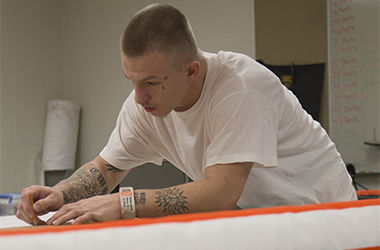Inmate work program benefits inmates and community
November 9, 2014
The Portage County Jail is keeping its inmates busy. Sheriff David Doak noticed the inmates playing the same board and card games over and over again and wanted to change that. With the help of Major Dale Kelly, Doak created an inmate work program and the inmate sewing program. Inmates said these programs have helped them gain useful knowledge and skills. The programs are also helping the jail’s budget. The inmates clean, paint, mow, sew and garden. Sheriff Doak says it is a win-win for the jail and inmates.
The programs
Robert Symsek casually joked and talked with a group of men in bright yellow t-shirts working on sanding down a car — a normal work routine at the Portage County jail.
The only difference is that the men in yellow shirts are inmates, and Sgt. Symsek is a corrections officer. While this might not seem like a normal interaction at a corrections facility, it has become commonplace at the Portage County Jail, thanks to the jail’s inmate work program.
“We’re looking to make people better when they come out than when they went in,” Symsek said about the program.
Through this program, inmates learn life skills such as sewing, cooking, carpentry and car detailing, which they can use to get a job after their prison term.
“I said you know we could put those guys to work and accomplish a lot at no cost, and they could learn something of it, so its a win-win,” Doak said.
The program started small but has grown to include a wide range of products and services, including fixing patrol cars, painting, growing produce in the jail’s garden, sewing and doing laundry.
Doak said if the inmates don’t know how accomplish one of the tasks they are assigned, the jail brings a professional in to teach them.
Symsek said that one of the main benefits of these programs is that inmates are working toward a common cause.
“The program has created a lot of time where the inmates are actually busy, they don’t have time to think about why they’re here or about getting in fights,” Symsek said.
Dennis Inman, a participant in the program, agreed with Symsek.
“It’s an excellent program,” he said. “It’s nice to be treated as a normal human being. They treat us very well.”
How it works
Inmates pay for the supplies they need to accomplish tasks through the jail’s commissary fund.
When inmates purchase items from commissary, that money goes toward purchasing materials needed to fund the program.
“We started small until we got some money built up,” Symsek said. “And then they’re buying lawn mowers and sewing machines and now we have a patrol car.”
Inmates are supervised and both men and women are allowed to participate. Not all inmates are allowed into the program, though.
Each inmate that wants to participate must first go through a screening process and only those held on non-violent charges are allowed to participate. Symsek said about 30 inmates choose to participate out of 248.
The program provides about 21,000 to 23,000 hours of free labor to the jail and the community. Inmates have the option of taking a night or day shift. Those that work the night shift clean the jail’s floors while inmates that work during the day perform activities such as sewing uniforms, doing laundry and picking up trash alongside the highway.
Programs similar to the one at Portage County also exist in other jails throughout the state of Ohio including Montgomery, Lake and Geagua counties.
Contact at Jacqueline DeMate at [email protected].












